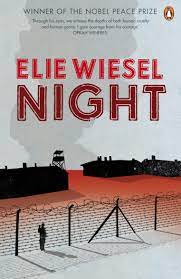Night is a novel based on a true story detailing the events of the holocaust and a narrative of hope about better days ahead. The main character, Elie experiences terrible things but hopes things will be better. However, Elie’s hope gets tested, especially at the concentration camp, where he experiences and witnesses terrible things such that, at some point, he no longer reconciles with the notion of an all-knowing and just God.
Initially, Elie’s firm faith in God is consistent, as seen through praying at night in the synagogue until he weeps and studying the Talmud during the day. At the beginning of the story, twelve-year-old Elie, whose life revolves around Judaism, declares, “I believed profoundly “(Wiesel). Besides, there is Elie’s wish to study Jewish mysticism (cabbala) although his father argues that Elie is still young. Notably, Elie’s faith is a byproduct of the cabbala’s teachings, which state that God is omnipresent and that everything exists through God’s will and power.
The faith in God is absolute when he is asked why he prays as he answers, “Why did I pray… Why did I live? Why did I breathe?” Elie’s response reflects his faith in an unconditional and omnipotent God who Elie cannot live without. Despite his tribulations in the camp, Elie hoped that after liberation, he would move from Europe to Haifa (Wiesel 50). According to research, the impact of a person’s faith manifests in personality aspects of optimism and hope. Many Christians and Jews argue faith refers to holding on to God’s promises and is an unquestionable belief requiring no evidence or proof (Phillips 15). Therefore, this religious orientation shows Elie’s faith as hope for a better future.
However, this hope is tested and falters when his faith in goodness is shaken by the evil and cruelty he witnessed in the concentration camps. Like the rest of his people, Elie is horrified as he witnesses children burned alive but unlike the other Jewish men reciting the Kaddish, Elie questions his faith. He states, “The Almighty, the eternal and terrible Master of the Universe, chose to be silent.
What was there to thank Him for?” (Wiesel 33). Elie notices that the more his people continue to pray, the more their families continue to be incinerated as others succumb to starvation. Like Akiba Drumer the rabbi who helps Elie’s faith endure for some time, Elie finally loses hope with the last blow to his belief being the hanging of a young boy.
Precisely, when someone in the crowd asks where God is, Elie’s internal response is, “Where He is? This is where—hanging here from this gallows… “(Wiesel 65). Somehow, his disappointment in God does not diminish his belief in God because when he is initially asked why he prays he answers, I pray to the God within me that He will give me the strength to ask Him the right questions” (Wiesel 3).
Questioning, in other words, is fundamental to Elie’s notion of faith in God. For instance, Elie keeps on referring to the bible even after he denies his faith. Additionally, after his father passes on, he regrets that there is no Jewish memorial. Although the holocaust’s horrors push Elie to question the existence of God, the questions reflect his faith and commitment to God, which connect to the hope of better days.
Conclusively, hope is among the main themes of the book Night. However, certain things Elie witnesses fail to reconcile in the faith that is the foundation of his hope. Wiesel bases his novel around the horrors he experienced and the things that make him persevere and forge ahead. Elie experiences a life of destruction but lives on with the purpose of liberation, even when he feels God’s troubling silence. Although the horrors of the Holocaust forever change Eli, the hope rooted in his faith remains intact.
Works Cited
Phillips, RORY LAWRENCE. “Faith without hope is dead: moral arguments and the theological virtues.” Religious Studies (2020): 1-17.
Wiesel, Elie. Night. Vol. 55. Macmillan, 2006.

